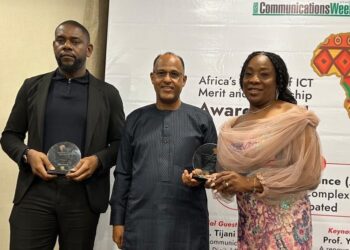A publication from Deloitte defines the digital economy as ‘the economic activity that results from billions of everyday online connections among people, businesses, devices, data, and processes.
The backbone of the digital economy is hyperconnectivity which means the growing interconnectedness of people, organisations, and machines that results from the Internet, mobile technology, and the Internet of Things (IoT).
A digital economy reflected via E-Business, E-commerce, E-marketplaces, E-learning, Social networking etc
Its key attributes are that it is; digitalized, connected, Shared, personalized, powered by the internet, borderless, fast-paced, data-driven and competitive to, mention a few.
Some key benefits of a digital economy are:
- The expansion of business opportunities leveraging technology
- The creation of new employment opportunities
- The enhancement of public Services e.g. healthcare, immigration, social welfare and security etc
- The rapid rise of e-commerce
- Increased automation (Electric Commute, Robotics, Internet of Things etc)
An overview of the Nigerian landscape
Introduction
The ministry in charge of the digital economy in Nigeria is the Federal Ministry of Communications, Innovation and Digital Economy (FMCoIDE).
It was created to facilitate ICT as a key tool in the transformation agenda for Nigeria in the areas of job creation, economic growth and transparency of governance.
It is headed by Dr Bosun Tijani. Under his watch, it aims to create and formulate policies that will propel the Nigerian economy to a fully digitalized economy.
The mandates of the (FMCoIDE) as stated on its website are to;
- Facilitate universal, ubiquitous, and cost-effective access to communications infrastructure throughout the country.
- Promote the utilization of ICT in all spheres of life to optimize the communications infrastructure – digital content creation, domestic software applications and the delivery of private and public services over the Internet.
- Promote and facilitate the development of the ICT industry and increase the contribution of the ICT industry to GDP.
- Utilize ICT to drive transparency in governance and improve the quality and cost-effectiveness of public service delivery in Nigeria.
As summarily stated by the Honourable Minister of Communications, Innovation & digital Economy in his recently published strategic plan, its mandate is to ‘’accelerate the diversification of the Nigerian economy by enhancing productivity in critical sectors through technological innovation.”
The Synopsis of the Strategic Agenda for the FMCoIDE: 2023-2027
The agenda aims to foster growth based on 5 strategic pillars:
- Knowledge
- Policy
- Infrastructure
- Innovation, Entrepreneurship and Capital
- Trade
Some of the key objectives put in place over the period along the lines of the pillars above are;
- It will be growing the capacity and knowledge base via:
- The training of 3 million mid-career technical talents over 4 years(3MTT).
- Investment in research across the technical domains of AI, Unmanned Aerial Vehicles, Internet of Things, Blockchain, Robotics and additive manufacturing to position Nigeria within the 25% percentile globally.
- Boosting the digital literacy level to 70% by 2027.
- It projects to put in place several policies that will birth outcomes such as those provided below;
- 80% broadband Coverage provision by 2027
- Achieving data speeds of 25mbps (urban areas) and 10mbps (underserved areas)
- 300-500% increase in broadband investment by 2027
- 22% net GDP contribution of the telecommunications sector by 2027
- 100% increase in net annual contribution by 2027
- Increase investment into Nigeria’s telecoms sector by 15% year on year.
- Increase in the number of startups using blockchain technology.
- 100% increase in the number of start-ups with access to incentives
- Achieve top 50 global ranking in AI readiness and adoption for Nigeria by 2030
- 70% digital literacy level for youths and adults by 2027
- The planned significant focus and investment in infrastructure will lead to:
- Laying of 95,000Km of fibre optic cable across the country
- Set up a digital public infrastructure: OneGov which will be the centralized source for all government services
- A revitalized Nigerian Postal Service (NPS) to serve as the last mile for commercial and government agencies
- Increase in spectrum efficiency
- 50% utilization of identified spaces for innovation and tech-related activities
- 75% increase in the utilization of NigComSat by 2027
- The government aims to grow Innovation, Entrepreneurship and Capital which will lead to:
- Increase in capital raised by Nigerian tech firms from $1Bn in 2022 to $5Bn by 2027.
- Trade will also be promoted aggressively to;
- Improve the country’s ECI (economic complexity index) from the 99 percentile to the 70 percentile.
- 500% growth in intra-African trade by 2027
Aligning to support the digitalization agenda of the FMCoIDE
The strategic blueprint is already being implemented via the 3MTT program. This is the first step leading on a journey that terminates in 2027 with the projected achievement of these milestones.
On a primary level, this agenda will catalyse business and growth across all sectors of the Nigerian economy. The success or failure of this agenda will however rest on IT sector players.
These IT Infrastructure companies that provide broadband connectivity, network solutions, data centres, cloud solutions, software, server & storage systems, and cybersecurity will be providing the structural foundation that this technological and economic advancement will ride on.
For perspective, IT infrastructure providers will be needed to complement the efforts of the Galaxy Backbone in serving Ministries, Departments, and Agencies (MDAs), with Network Solutions, Cloud Services, Cybersecurity, and Broadband Access to mention a few.
Some specific examples are the OneGov portal, NIPOST, and Nigerian Stack partnership. Several local companies, like Layer3 and others, are already driving the adoption of these services.
A major opportunity that presents itself to these players is Nigeria’s data sovereignty law, which enables localized private cloud companies to securely warehouse citizenry and national data encompassing financial, educational, healthcare, and other critical data. Payments for these services are made in NGN.
This contrasts with the use of foreign cloud sources which require payments in foreign currency with data warehoused outside the shores of Nigeria, contravening the data sovereignty laws.
Localized cybersecurity service providers also find opportunities in the need for the provision of the system security needed to fight cyber-attacks expected to increase significantly because of this foray into the digital economy and the increased broadband infrastructural installations.
Broadband Internet providers will see increased investments, both from local and foreign sources, as demand for their services will soar if there is a sincere and successful push by the FMCoIDE to actualize the digital economy ambition.
From small-scale companies to medium, large private and government enterprises, broadband access is no longer nice to have, but ubiquitous and an essential and integral part of everyday life.
In summary, the strategic roadmap provided is a unique opportunity that should be welcomed by all players within the IT ecosystem, whether on the supply or demand side of things as, if executed properly, guarantees Nigeria a seat at the Global table of the world’s top-ranked digitalized economies.
Bibliography
https://www2.deloitte.com/mt/en/pages/technology/articles/mt-what-is-digital-economy.html)
(https://www.vedantu.com/commerce/digital-economy)
https://www.ir.com/guides/the-importance-of-the-digital-economy




















